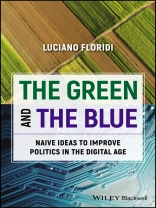Presenting an array of innovative concepts to revolutionize politics in our digital world, this book is written by one of the most authoritative voices of contemporary philosophy
The Green and the Blue explores the opportunities presented by the digital age for combining green environmental policies with blue digital solutions to strengthen democracy, reform capitalism, and work toward a sustainable and equitable future. With an engaging and readable style, world-renowned philosopher Luciano Floridi lays out a timely and convincing case for embracing responsible practices to ensure a sustainable environment, a better democracy, and an equitable information society.
Drawing from his expertise in digital ethics and the philosophy of technology, Floridi offers fresh perspectives, innovative ideas, and bold strategies for improving political systems that emphasize the importance of cooperation, ethics, and long-term planning. Throughout the text, the author advocates for a political and economic framework of care that focuses on the quality of relations and processes rather than consumption and things. A groundbreaking call to action for individuals, policymakers, and technologists, The Green and the Blue: Naive Ideas to Improve Politics in the Digital Age:
* Provides a comprehensive, interdisciplinary, and well-rounded exploration of how to improve the present by designing good policies for the future
* Features insightful analysis by the founder of the philosophy of information and one of the key interpreters of the digital revolution
* Explains complex concepts to allow easy understanding and application of the ideas presented
* Includes compelling thought experiments that challenge traditional notions of capitalism and politics
* Encourages readers to think critically about the present and future of politics
Offering a new way of thinking about democracy, the environment, and technology, The Green and the Blue: Naive Ideas to Improve Politics in the Digital Age is a must-read for undergraduate and graduate students, practitioners, and general readers who are seeking positive and sustainable change in the world of politics.
สารบัญ
Preface vii
Acknowledgement x
Chapter 1: The Importance of Naive Ideas 1
Chapter 2: The Digital Revolution 9
Chapter 3: The Transition from Things to Relations 24
Chapter 4: The Infosphere 41
Chapter 5: Fake News 46
Chapter 6: Digital Time 49
Chapter 7: The Onlife Experience 56
Chapter 8: A Mature Information Society 65
Chapter 9: The Human Project 71
Chapter 10: From the Social Contract to a Universal Trust 79
Chapter 11: Infraethics 85
Chapter 12: Human Interfaces 93
Chapter 13: Human Dignity 100
Chapter 14: The Problem of Leisure Occupation 109
Chapter 15: Homo: Faber, Sapiens, Ludens, and Poieticus 120
Chapter 16: A Proxy Culture 128
Chapter 17: Politics as Marketing 135
Chapter 18: Digital Grey Power 142
Chapter 19: The Digital Gift Economy 148
Chapter 20: Structural Democracy 154
Chapter 21: Stealth Democracy 162
Chapter 22: Nomos and Paideia 169
Chapter 23: Digital Sovereignty 174
Chapter 24: Green and Blue for a Sustainable and Preferable Future 188
Chapter 25: The Value of Waste 198
Chapter 26: Climate Change and the Terrible Hope 202
Chapter 27: From Self-regulation to Legislation 207
Chapter 28: Hundred Political Theses for a Mature Information Society 212
Postscript – The Information Society in the Time of the Coronavirus 233
Acknowledgements 237
References 239
Index 244
เกี่ยวกับผู้แต่ง
LUCIANO FLORIDI is the Founding Director of the Digital Ethics Center and a Professor in the Cognitive Science Program at Yale University.












